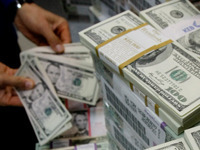Greg Smith writes scathing indictment of Goldman Sachs
Greg Smith gained an overnight reputation as the Judas of Goldman Sachs by writing a scathing indictment of the investment bank. Talk about creating a buzz: Smith took the extraordinary step of writing a highly unflattering op-ed piece on Wednesday for the New York Times. By doing so, he broke ranks with a world in which the big-money crowd on Wall Street happily pockets its bonuses and doesn't tend to rock the boat in public.

A Goldman Sachs spokeswoman subsequently told the Times: "We disagree with the views expressed, which we don't think reflect the way we run our business." But the damage to the firm's image has been done. Smith, a Wall Street star, has introduced another chapter to his legacy. Eventually, he may add another credit. He could be regarded as a media trailblazer in the rarified world of disgruntled millionaires everywhere, says MarketWatch.
Blankfein disputed his former employee's description of the firm's culture. In a letter to his staff, the chief executive wrote, "We were disappointed to read the assertions made by this individual that do not reflect our values, our culture and how the vast majority of people at Goldman Sachs think about the firm and the work it does on behalf of our clients."
Before the recession, Goldman enjoyed a near-pristine image, and its top executives such as Henry M. Paulson, Robert Rubin and Jon S. Corzine moved easily into prominent government posts after leaving the firm. But the financial crisis blemished that reputation, and this episode marks another challenge to restoring it, reports Washington Post.
The Times said the essay had received 3 million page views online by 4 p.m. The second-most-viewed story had 500,000, and that was a business section story about the essay. Goldman CEO Lloyd Blankfein and President Gary Cohn told the bank's employees in an open letter that Smith's claims did not reflect the culture of the bank. They cited glowing internal reviews of the service Goldman provides to clients.
"It is unfortunate that all of you who worked so hard through a difficult environment over the last few years now have to respond to this," they wrote. Smith worked for Goldman in London when he resigned, but the bank did not provide further details or say how much money Smith made. He previously worked in the New York office, informs San Francisco Chronicle.
As for all those Goldman clients, the firm had a very public problem with its penchant for conflicts of interest. Goldman's private-equity arm was armed with so much cash it was a potential buyer in every deal. That put its corporate advisers in conflict.
Finally, consider that a good one-third of Mr. Smith's career has passed since the financial crisis. During that time, Goldman and Mr. Blankfein have been dragged before congressional panels, suffered Securities and Exchange Commission investigations and been mocked as the infamous "vampire squid." Are we really supposed to believe that Mr. Smith kept his faith even as Goldman agreed to pay $500 million to settle charges in the Abacus case? Remember, the central charge in that case was that Goldman screwed its customers, according to Wall Street Journal.
Subscribe to Pravda.Ru Telegram channel, Facebook, RSS!




